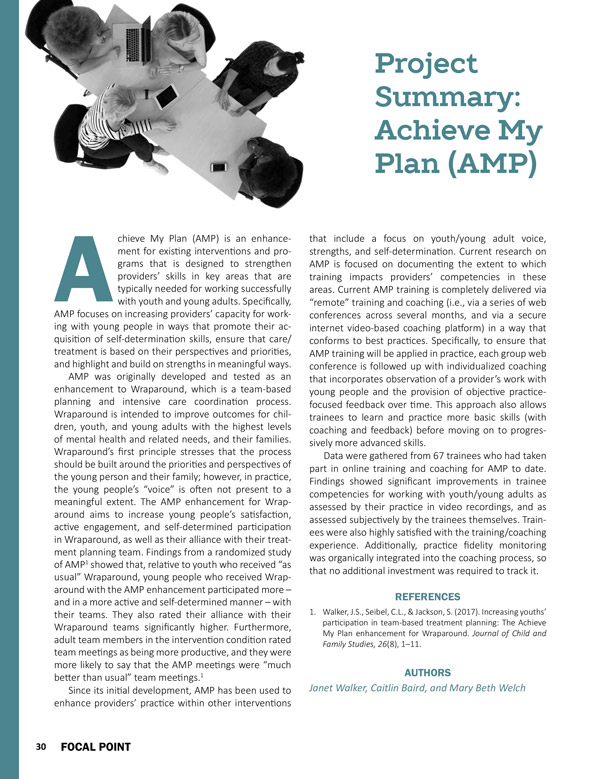
Abstract: This project summary describes Pathways' use of an online training and coaching approach to strengthen key skills for providers working with youth and young adults.
"Project Summary: Achieve My Plan (AMP)" (2018)
By Janet Walker, Caitlin Baird, & Mary Beth Welch
Achieve My Plan (AMP) is an enhancement for existing interventions and programs that is designed to strengthen providers’ skills in key areas that are typically needed for working successfully with youth and young adults. Specifically, AMP focuses on increasing providers’ capacity for working with young people in ways that promote their acquisition of self-determination skills, ensure that care/treatment is based on their perspectives and priorities, and highlight and build on strengths in meaningful ways.
AMP was originally developed and tested as an enhancement to Wraparound, which is a team-based planning and intensive care coordination process. Wraparound is intended to improve outcomes for children, youth, and young adults with the highest levels of mental health and related needs, and their families. Wraparound’s first principle stresses that the process should be built around the priorities and perspectives of the young person and their family; however, in practice, the young people’s “voice” is often not present to a meaningful extent. The AMP enhancement for Wraparound aims to increase young people’s satisfaction, active engagement, and self-determined participation in Wraparound, as well as their alliance with their treatment planning team. Findings from a randomized study of AMP1 showed that, relative to youth who received “as usual” Wraparound, young people who received Wraparound with the AMP enhancement participated more – and in a more active and self-determined manner – with their teams. They also rated their alliance with their Wraparound teams significantly higher. Furthermore, adult team members in the intervention condition rated team meetings as being more productive, and they were more likely to say that the AMP meetings were “much better than usual” team meetings.1
Since its initial development, AMP has been used to enhance providers’ practice within other interventions that include a focus on youth/young adult voice, strengths, and self-determination. Current research on AMP is focused on documenting the extent to which training impacts providers’ competencies in these areas. Current AMP training is completely delivered via “remote” training and coaching (i.e., via a series of web conferences across several months, and via a secure internet video-based coaching platform) in a way that conforms to best practices. Specifically, to ensure that AMP training will be applied in practice, each group web conference is followed up with individualized coaching that incorporates observation of a provider’s work with young people and the provision of objective practice-focused feedback over time. This approach also allows trainees to learn and practice more basic skills (with coaching and feedback) before moving on to progressively more advanced skills.
Data were gathered from 67 trainees who had taken part in online training and coaching for AMP to date. Findings showed significant improvements in trainee competencies for working with youth/young adults as assessed by their practice in video recordings, and as assessed subjectively by the trainees themselves. Trainees were also highly satisfied with the training/coaching experience. Additionally, practice fidelity monitoring was organically integrated into the coaching process, so that no additional investment was required to track it.
References
- Walker, J.S., Seibel, C.L., & Jackson, S. (2017). Increasing youths’ participation in team-based treatment planning: The Achieve My Plan enhancement for Wraparound. Journal of Child and Family Studies, 26(8), 1–11.
Suggested Citation
Walker, J., Baird, C., & Welch, M.B. (2018). Project Summary: Achieve My Plan (AMP). Focal Point: Youth, Young Adults, and Mental Health, 32, 30. Portland, OR: Research and Training Center for Pathways to Positive Futures, Portland State University.